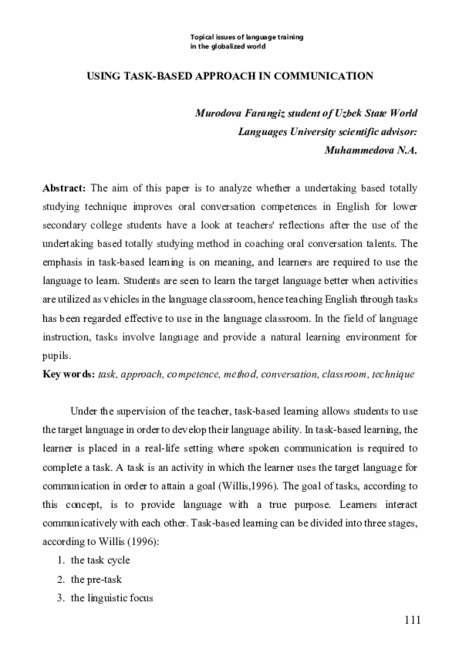
Topical issues of language training
in the globalized world
111
USING TASK-BASED APPROACH IN COMMUNICATION
Murodova Farangiz student of Uzbek State World
Languages University scientific advisor:
Muhammedova N.A.
Abstract:
The aim of this paper is to analyze whether a undertaking based totally
studying technique improves oral conversation competences in English for lower
secondary college students have a look at teachers' reflections after the use of the
undertaking based totally studying method in coaching oral conversation talents.
The
emphasis in task-based learning is on meaning, and learners are required to use the
language to learn. Students are seen to learn the target language better when activities
are utilized as vehicles in the language classroom, hence teaching English through tasks
has been regarded effective to use in the language classroom.
In the field of language
instruction, tasks involve language and provide a natural learning environment for
pupils.
Key words:
task, approach, competence, method, conversation, classroom, technique
Under the supervision of the teacher, task-based learning allows students to use
the target language in order to develop their language ability. In task-based learning, the
learner is placed in a real-life setting where spoken communication is required to
complete a task. A task is an activity in which the learner uses the target language for
communication in order to attain a goal (Willis,1996). The goal of tasks, according to
this concept, is to provide language with a true purpose. Learners interact
communicatively with each other. Task-based learning can be divided into three stages,
according to Willis (1996):
1.
the task cycle
2.
the pre-task
3.
the linguistic focus

Topical issues of language training
in the globalized world
112
Under the supervision of the teacher, task-based learning allows students to use
the target language in order to develop their language ability. In task-based learning, the
learner is placed in a real-life setting where spoken communication is required to
complete a task. A task is an activity in which the learner uses the target language for
communication in order to attain a goal (Willis, 1996). The goal of tasks, according to
this concept, is to generate a real purpose for language use in which learners participate
communicatively. Task-based learning can be divided into three stages, according to
Willis (1996):
1.
A task is a plan of action.
2.
A task is designed to employ language in real-world operations
3.
A task can include any of the four language abilities
4.
A task engages cognitive processes
5.
A task has a clearly defined communicative outcome
Learners want to apply the goal language in a herbal environment. The finishing
touch of duties with inside the school room affords learners a placing wherein they
could carry out the sports naturally. Task-primarily based totally learning is designed
to permit learners to carry out a challenge through the usage of the goal language.
Thus, it's miles learner-centered. Moreover, newcomers use the language freely. It
have to be referred to that language improvement will become greater powerful if
shape and which means is created. Although mission primarily based totally learning
offers greater interest to that means, learners collect the goal language.
The classroom language and the language used outside the classroom should be
linked Task-based learning is an easy way of language acquisition. Learners stand a
better chance of practicing with the language while performing tasks. That learners
communicate with each other in the target language and perform tasks is an effective
way to meet their needs for the development of communication skills. Language
learners need to use the language in the real world. Task-based learning allows learners
not only to acquire language but also practice it. By means of performing tasks with
others in the classroom learners try out communication strategies.

Topical issues of language training
in the globalized world
113
To sum up,
Task-based learning provides the immediate needs of the learner.
The focus is on learning to communicate through interaction in the target language,
therefore the learner needs to produce ideas and opinions. The aim of task-based
learning is to integrate all four skills and to move from fluency to accuracy plus fluency.
During task-based learning, students solve tasks that are relevant and interesting to
them. In order to solve the task, they need to use the target language they're learning to
communicate with their peers.
References
1.
Ellis, R. (2003). Task-Based Language Learning and Teaching. Oxford: Oxford
University Press.
2.
Lindsay, C. & Knight, P. (2006). Learning and Teaching English: A Course for
Teachers. Oxford: Oxford University Press.
3.
Swan, M. (2005). Legislation by Hypothesis: The Case of Task-Based
Instruction. Applied Linguistics 26 (3), 376-401.
4.
Rahman, M. M. (2010). Teaching oral communication skills: A task-based
approach. ESP World, 9(1), 1-11.
5.
John
A.C.
Opera
Didactica
Omnia.-
<http://www.lifecircles-
inc.com/Learningtheories/constructivism/kolb.html>
6.
Далиева, Мадина Хабибуллаевна. "THEORETICAL FEATURES OF
POLYSEMY IN LINGUISTIC TEXTS." МЕЖДУНАРОДНЫЙ ЖУРНАЛ
ИСКУССТВО СЛОВА 5.5 (2022).
7.
Далиева,
Мадина
Хабибуллаевна.
"Классификация
сленга
в
нестандартных вариантах." NovaInfo. Ru 1.95 (2018): 52-55.
8.
Madina, Dalieva. "CONCEPTUALIZATION OF TERMS-PRINCIPLES AND
METHODS." EPRA International Journal of Multidisciplinary Research
(IJMR) 9.10 (2023): 249-250.
9.
Dalieva, M. Kh. "ISSUES ON STUDYING CONCEPTUAL MEANING OF A
WORD IN A LITERARY TEXT." Thematic Journal of Applied Sciences 3.4
(2023).






